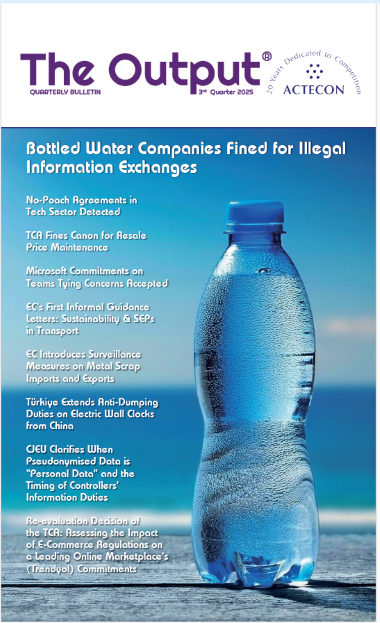The Turkish Competition Authority fines a leading online platform €3.8M for abuse of dominant position through the restriction of data portability and enforcement of exclusive practices (Sahibinden)
| Competition Law

Article By Ertuğrul Can Canbolat, Can Yıldız, Yavuz Yıldız, Ali Katoğlu
The Turkish Competition Authority fines a leading online platform €3.8M for abuse of dominant position through the restriction of data portability and enforcement of exclusive practices (Sahibinden)
Introduction
The Turkish Competition Authority (“TCA”) has issued a reasoned decision in a significant case related to Sahibinden Bilgi Teknolojileri Pazarlama ve Ticaret AŞ (“Sahibinden”), finding that the company abused its dominant position in the online platform services markets for (i) the real estate sale/renting activities of corporate members and (ii) the vehicle sales activities of corporate members. [1]
The investigation revealed that Sahibinden restricted data portability, enforced both de facto and contractual exclusivity, and complicated its competitors’ activities, resulting in a fine of approximately EUR 3.8 million [2] and a set of remedies to address its anti-competitive practices.
This decision marks a notable step in the TCA’s efforts to tackle anti-competitive behaviour in digital markets. Building upon both the TCA’s past practice and international approaches to data portability as a competitive concern, the case reinforces an emerging body of case-law being formed and signals increased scrutiny into restrictions of data portability by dominant undertakings.
The TCA’s Assessment of the Abuse
Data Portability as a Competitive Concern
The TCA, touching upon data portability as a competitive parameter and the theories of harm related thereto in its decision, has underscored that, as abusive behaviours of undertakings in dominant position may take different forms, the refusal of a dominant undertaking to provide or facilitate data portability may constitute a form of exclusionary abuse.
Accordingly, the restriction of data portability may result in switching or replacement costs for the data owner. Due to switching costs, data subjects may prefer to stay on the platform they first entered if they find it burdensome to migrate their data to another platform, even if a better and cheaper alternative is available, thereby allowing incumbent providers to tie users to their services (lock-in effect). Moreover, even if competing platforms do not offer a better service, users may often want to multi-home, i.e. use more than one platform at the same time for a particular service. Therefore, limiting data portability may make it difficult for users to utilise multiple platforms for the same service, thereby reducing competition and innovation in the market.
The TCA went on to highlight that such restrictions may also artificially increase competitors’ costs, as they may force competitors to use additional resources to incentivise the use of their platforms, causing entry barriers for competitors and constituting an exclusionary abuse. This may have direct or indirect negative effects on competition and consumer welfare, such as limiting technical/economic developments in the market to the detriment of consumers. In addition, even the mere possibility of data portability may allow prices to be set at more competitive levels. Where data portability is possible, the ability of users not satisfied with services offered by one platform to easily switch to another may limit excessive pricing practices.
It was also noted by the TCA that when data congestions and bottlenecks hinder competition and innovation, the remedy within the framework of competition law may take the form of obligations “to change the way market participants access data”. One example of this is the adoption of the Digital Markets Act of the European Union [3], introducing obligations for undertakings that have reached a certain market power to refrain from certain practices. One of the obligations imposed within the scope of DMA is to allow end-users or third parties authorised by end-users to migrate aggregated and non-aggregated data of end-users or generated within the scope of their activities on the relevant platform, and to provide tools to facilitate data portability, all free of charge and efficiently. This provision, Article 6.9., aims to facilitate cross-platform migration and multi-access, thus enabling competitors to bring innovative solutions to the market by increasing their potential user base.
The TCA also underlined the presence of multiple OECD reports indicating data portability fosters competition by reducing migration costs and easing more entries into the markets.
The Abuse
Within the scope of its investigation, the TCA defined, for the purposes of this investigation and in relation to the prevention of data portability, the relevant product markets as (i) the online platform services market for the real estate sale/renting activities of corporate members and (ii) the online platform services market for the vehicle sales activities of corporate members. The TCA has also maintained its position just as in its previous investigations against Sahibinden that the relevant geographic market is Türkiye.
As for the assessment of dominance, the TCA, by taking into account (i) the fact that Sahibinden has very high market shares in both relevant product markets and maintains that high market shares over the years, [4] (ii) the existence of many barriers to entry into and expand in both markets, such as significant network effects resulting from the multi-sided platform nature of online hosting services, economies of scale, user habits, the high brand awareness as well as the financial and economic strength that Sahibinden has, (iii) the fact that none of the corporate clients of Sahibinden has the buyer strength and scale vis-à-vis Sahibinden, in addition to the fact that expecting Sahibinden’s corporate clients, who maintain the real estate sale/renting and vehicle sales activities, would be unreasonable to create their own source of supply.
In its decision, the TCA assessed that the prevention Sahibinden’s actions of data portability and de facto/contractual exclusivity stem from the contracts concluded between Sahibinden and its corporate members, namely the contracts that are obligatory for a member to be able to advertise on the Sahibinden portal [5](“Portal”). Within this scope, it is found by the TCA that:
• an article of the Sahibinden Corporate Membership Contract (“Contract”) prohibits corporate members from accessing the advertisements published on the Portal, copying these advertisements, transferring these advertisements to a different database or to a different medium, including competing platforms, publishing them or making them available to third parties.
• the relevant contractual provision might be the reason for such low rates of simultaneous use of more than one platform in practice. In addition, this provision not only prevents corporate members from obtaining the advertisement data belonging to them, but also prevents competitor platforms from transferring the relevant advertisements from the Portal to their own platforms.
• an article of the Sahibinden User Agreement’s annex (“Annex”) prevents corporate members from transferring their advertisement data both to their own sites and to competitor platforms within the framework of the methods developed by competitors.
• an article of the Contract and some articles of the Annex are aimed at malicious actions such as violating the real or personal rights, personal data, assets of a real person or a legal entity. However, these articles may be interpreted broadly and used to prevent the acts prohibited in the first-mentioned article of the Contract. By these articles, corporate members are prohibited from transferring or copying part or all of their own advertisements and other actions to be taken for this purpose, unless they have the written permission of Sahibinden. The use of the advertisements published on the Portal, even if the subject is the corporate member who owns the advertisement, is limited to viewing the content of the advertisement.
• more importantly, the phrase “...accepts and undertakes that it will not directly and/or indirectly compete with Sahibinden either by these actions or by other means” in the abovementioned article of the Contract and one article of the Annex is of a nature to prevent simultaneous platform use and to create exclusivity and even to prevent members from competing with Sahibinden through their own channels.
• the Portal prevents bulk or automatic data transfer to the Portal from channels such as the members’ own websites, MLS systems [6] or competing platforms.
In its conclusion, the TCA found that (i) one of the articles of the Contract and one article of the Annex include a non-compete obligation, (ii) two articles of the Contract and numerous articles of the Annex prevent the corporate members from transferring the data of their own advertisements to their own channels, other portals created by the members’ associations/chambers, or systems such as MLS systems and competitor platforms, thereby causing de facto exclusivity by making it difficult for the corporate members to access and use more than one platform and thus making the activities of Sahibinden’s competitors difficult within the scope of Article 6 of Competition Law.
The TCA, on the other hand, rejected the allegations that (i) Sahibinden made it difficult for its corporate members to use more than one platform by imposing sub-user limitations on them, (ii) did not publish doped advertisements transparently, (iii) did not act transparently in the application of natural advertising, (iv) favoured itself through the ranking algorithm and favoured itself/gave misleading results in other services it provided (such as real estate/vehicle valuation, directing to authorized dealers in brand new vehicle sales, providing expertise), (v) and abused its dominant position by restricting competition in the said ways.
The Fine and the Obligations
The TCA, accusing Sahibinden of abusing its dominant position in light of the foregoing, decided to impose an administrative fine of TRY 40,150,533.15 (approximately EUR 3.8 million) on the undertaking.
Apart from the administrative fine, for ensuring the termination of the violation and the establishment of effective competition in the market, the TCA has obligated Sahibinden to:
• Re-arrange the Contract so as not to include the provisions subject to violation,
• To establish the infrastructure, free of charge, that will enable corporate members to effectively transfer their property and vehicle advertisement data on the Portal to competing platforms and to keep the data contained in these advertisements up to date,
• In case the corporate members having memberships in competing platforms request to transfer the property and vehicle advertisement data from these platforms to the Portal and to keep the data contained in the advertisements up to date on the Portal and the competing platforms accept this request; to establish the infrastructure that will enable the members to transfer and keep their data up to date as soon as reasonably possible without any charge, and ensure that the requests from the competing platforms are met uninterruptedly and effectively,
• To certify to the TCA at the beginning and at the end of the process in order for the TCA to determine whether the above-mentioned obligations are fulfilled in accordance with this decision, and
• To submit a report to the TCA for a period of 3 years from the start of the implementation of the first compliance measure and periodically once a year.
Approaches to Data Portability as a Competitive Concern
Prior to the TCA’s Sahibinden decision, there have been plenty of examples of approaches to data portability by competition authorities across different jurisdictions. To illustrate, the Google Adwords cases in the United States [7] and the European Union [8], the Toronto Real Estate Board decision in Canada [9], the GDF Suez decision in France [10], and the Bradesco case in Brazil [11] have focused on concerns that horizontal competition is hampered as a result of restricting access to data. These concerns have been addressed by providing access to data in the decisions rendered as a result of either the proceedings or in the settlements reached during these proceedings.
As for Türkiye, there have been two prominent decisions that have tackled data portability as a competitive concern, making Sahibinden decision the third.
The first among them, Bilsa decision, concerned the allegation that Bilsa, which operates in the school software services market, prevented other undertakings from accessing the information on schools and students studying in these schools, which must be used by these undertakings, by encrypting this information [12].
Even though the TCA concluded that encryptions done by Bilsa or other software companies for the protection of their software or the data generated by such software would not constitute an infringement, schools that want to cease using Bilsa’s software and use another software company’s product were prevented from openly accessing this data. The fact that these data were kept encrypted and not allowed to be transferred to other software after the end of the contract period created an artificial barrier to entry into the market. It was concluded that Bilsa, by preventing both the entry of new companies to the relevant market and the penetration of the companies that are present in the market, has prevented the formation of alternative software companies to which the schools in the market can switch without any cost, and thus, as the dominant player, has created an artificial entry barrier preventing the realisation of a functional competition in the market.
In its Nadir Kitap decision, which is the second decision of the TCA regarding data portability, the allegation that Nadirkitap Bilişim ve Reklamcılık AŞ (“ Nadir Kitap ”), which operates in the market for platform services providing intermediation for the sale of second hand books, abused its dominant position by complicating the activities of rival undertakings by not providing the data of its seller members who would like to market their products through rival intermediary service providers was handled [13].
The TCA found in its decision that (i) the failure to provide the relevant data to the seller members was decisive in terms of the sellers’ decisions to work with rival platforms, (ii) the sales through rival platforms were very limited when the number of sales and the number of books listed by the booksellers working with rival platforms were compared, (iii) one of the reasons for this is that the sellers exhibit only a limited part of their inventory on rival platforms. Thus, it has been determined that Nadir Kitap’s actions increase the switching costs of sellers to rival platforms, which makes it difficult for competitors to access sellers and thus their activities, also creating an entry barrier for undertakings wishing to enter the market.
One point to note in both cases is that the TCA, alongside the finding of a violation of Article 6, obligated Bilsa and Nadir Kitap to ensure data portability in an accurate, comprehensible, secure, complete, free of charge, and in an appropriate format, in order to terminate the infringement and restore effective competition in the market, resembling the obligations imposed on the recent Sahibinden decision.
Conclusion
The TCA’s Sahibinden decision, having many similarities with its past practice, signifies another milestone in the establishment of case-law concerning data portability as a competitive concern. It underscores that practices by dominant undertakings which restrict the free movement of user data are now increasingly being viewed as forms of de facto or contractual exclusivity within the scope of competition law. This decision once again highlights that any conduct by dominant firms that impedes the ability of users to move their data freely across platforms can constitute an exclusionary abuse, effectively locking clients into a single service and suppressing competition.
Such behaviour has been scrutinized not only in Türkiye but in various jurisdictions as competition authorities have long begun to emphasize the critical role of data portability in ensuring market dynamism and consumer choice. The approach taken by the TCA aligns with global trends where restrictions on data mobility are treated as anticompetitive, akin to contractual exclusivity clauses that inhibit competitors’ market access. The decision, with the imposition of a substantial fine and a series of remedial measures, serves as a warning for dominant companies to be mindful of practices that could be construed as creating either de facto or contractual exclusivity, as these may trigger competition law liabilities. By facilitating user mobility and minimizing artificial barriers, authorities aim to foster a competitive landscape that encourages innovation and consumer benefit.
Footnotes [1] TCA’s decision dated 17.08.2023 and numbered 23-39/754-263, accessible at: https://www.rekabet.gov.tr/Karar?kararId=34c2cb9b-58d4-4319-a329-cac0158de3e2.
[2] The EUR figure is converted using the Central Bank of Türkiye’s average buying exchange rate for 2021, which the calculation of turnover-based administrative fine was based upon. This rate is EUR 1= TRY 10.47 for 2021.
[3] Regulation (EU) 2022/1925 of the European Parliament and of the Council of 14 September 2022 on contestable and fair markets in the digital sector and amending Directives (EU) 2019/1937 and (EU) 2020/1828 (Digital Markets Act).
[4] While assessing the overall market shares in both markets, the TCA has taken into account (i) market shares in terms of number of corporate members, (ii) market shares in terms of corporate member revenues, (iii) market shares in terms of number of corporate advertisements, (iv) market shares in terms of number of web page views, all for the years between 2014 and 2021.
[5] Portal is the website where Sahibinden offers its services, consisting of the domain name www.sahibinden.com and the domain names connected to this domain name.
[6] Multiple listing services systems.
[7] Federal Trade Commission (2013), Google Agrees to Change Its Business Practices to Resolve FTC Competition Concerns In the Markets for Devices Like Smart Phones, Games and Tablets, and in Online Search, https://www.ftc.gov/news-events/news/press-releases/2013/01/google-agrees-change-its-business-practices-resolve-ftc-competition-concerns-markets-devices-smart.
[8] European Commission (2010), Antitrust: Commission probes allegations of antitrust violations by Google, https://ec.europa.eu/commission/presscorner/detail/en/ip_10_1624.
[9] Competition Tribunal (2016), https://www.ct-tc.gc.ca/en/cases/decision-summaries/documents/CT-2011-003%20Summary.pdf?zoom_highlight=toronto+real+estate+board%23search=%22toronto%252real%20.
[10] Autorité de la concurrence (2014), L’Autorité de la concurrence ordonne à GDF Suez d’accorder à ses concurrents un accès à une partie des données de son fichier historique, https://www.autoritedelaconcurrence.fr/fr/communiques-de-presse/lautorite-de-la-concurrence-ordonne-gdf-suez-daccorder-ses-concurrents-un#:~:text=Depuis%20le%201er%20juillet%202007,fournisseurs%20concurrents%20de%20GDF%20Suez.
[11] Conselho Administrativo de Defesa Econômica (2020), Bradesco enters into an agreement with CADE regarding an investigation of anticompetitive practice against GuiaBolso, https://www.gov.br/cade/en/matters/news/bradesco-enters-into-an-agreement-with-cade-regarding-an-investigation-of-anticompetitive-practice-against-guiabolso.
[12] TCA’s decision dated 21.03.2007 and numbered 07-26/238-77. [13] TCA’s decision dated 07.04.2022 and numbered 22-16/273-122.







